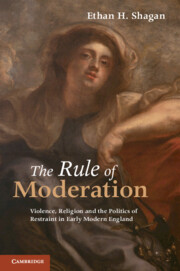Book contents
- Frontmatter
- Contents
- Figures
- Acknowledgements
- Abbreviations
- Prologue
- Part I Moderate foundations
- Part II Moderate churches
- Part III Moderate rule
- 5 English expansion and the empire of moderation
- 6 Social moderation and the governance of the middle sort
- 7 Moderate freedom in the English Revolution
- 8 How toleration became moderate in seventeenth-century England
- Conclusion
- Bibliography
- Index
- References
8 - How toleration became moderate in seventeenth-century England
from Part III - Moderate rule
Published online by Cambridge University Press: 05 June 2012
- Frontmatter
- Contents
- Figures
- Acknowledgements
- Abbreviations
- Prologue
- Part I Moderate foundations
- Part II Moderate churches
- Part III Moderate rule
- 5 English expansion and the empire of moderation
- 6 Social moderation and the governance of the middle sort
- 7 Moderate freedom in the English Revolution
- 8 How toleration became moderate in seventeenth-century England
- Conclusion
- Bibliography
- Index
- References
Summary
Introduction
Before the 1640s, the state's prerogative to punish religious deviance was almost unanimously praised as moderate, while broad claims for religious toleration were almost unanimously condemned as extremist. It was unimpeachable orthodoxy, backed by centuries of both Catholic and Protestant practice, that Christian princes should wield the sword of correction on behalf of the Church. In England, a self-consciously judicious and temperate defence of religious unity – prosecuting heresy and enforcing obligatory participation in the Established Church, but not ‘making windows into men's souls’ – had been the avowed policy of the government since Queen Elizabeth's reign, defining a middle way between the murderous Inquisition of the Catholics and the libertine permissiveness of the Anabaptists. Even puritans and Catholics who dissented from this version of moderation – positing toleration for ceremonial nonconformity, or separation from the Church of England, as alternative forms of moderation – with rare exceptions would have agreed with the puritan Thomas Cartwright's demand that teachers of heresy be put to death: ‘If this be bloody and extreme, I am content to be so counted with the Holy Ghost.’
By 1689, however, and the passage of the law misleadingly known as the ‘Toleration Act’, this consensus had collapsed. Many people throughout the Restoration Era continued to defend moderate religious coercion; in 1675, for instance, the Lord Keeper called the Test Act ‘a moderate security to the Church and crown’. But now competing visions of moderation suggested that any legal compulsion in matters of conscience constituted an excessive use of magisterial power. Thus, whereas in the 1640s defences of religious coercion routinely contained title phrases like ‘Moderation Justified’ and the ‘Advantages of Moderation’, by 1686 William Penn could write A Perswasive to Moderation defending religious toleration; by 1687 a Yorkshire Justice of the Peace, when asked if he could live ‘friendly with those of all persuasions’, replied that he could do so ‘in as much as I have always loved moderation’; and by 1714 an embattled defender of the old orthodoxy could lament that toleration was now widely accepted by ‘fashionable moderate men’.
- Type
- Chapter
- Information
- The Rule of ModerationViolence, Religion and the Politics of Restraint in Early Modern England, pp. 288 - 325Publisher: Cambridge University PressPrint publication year: 2011



